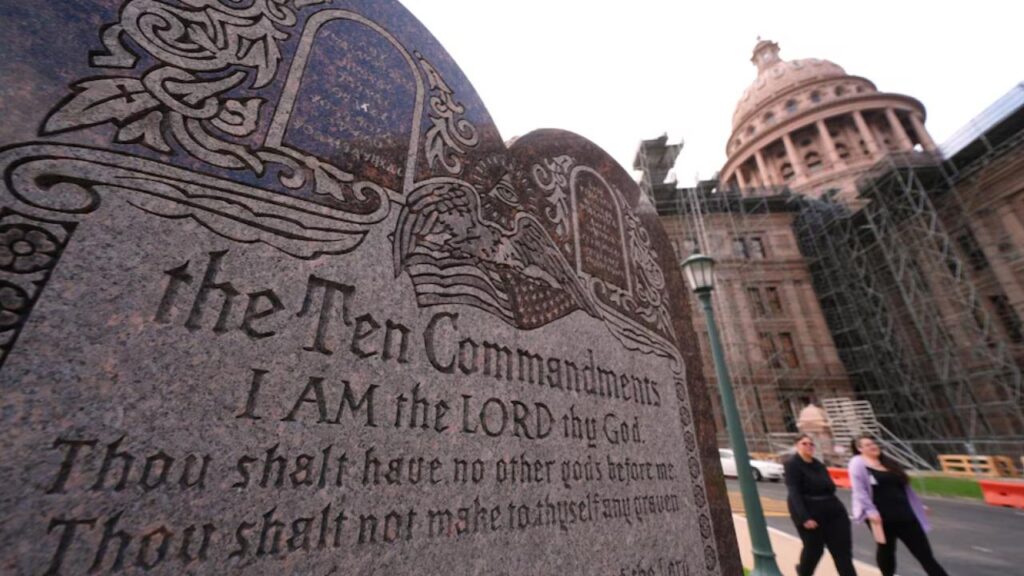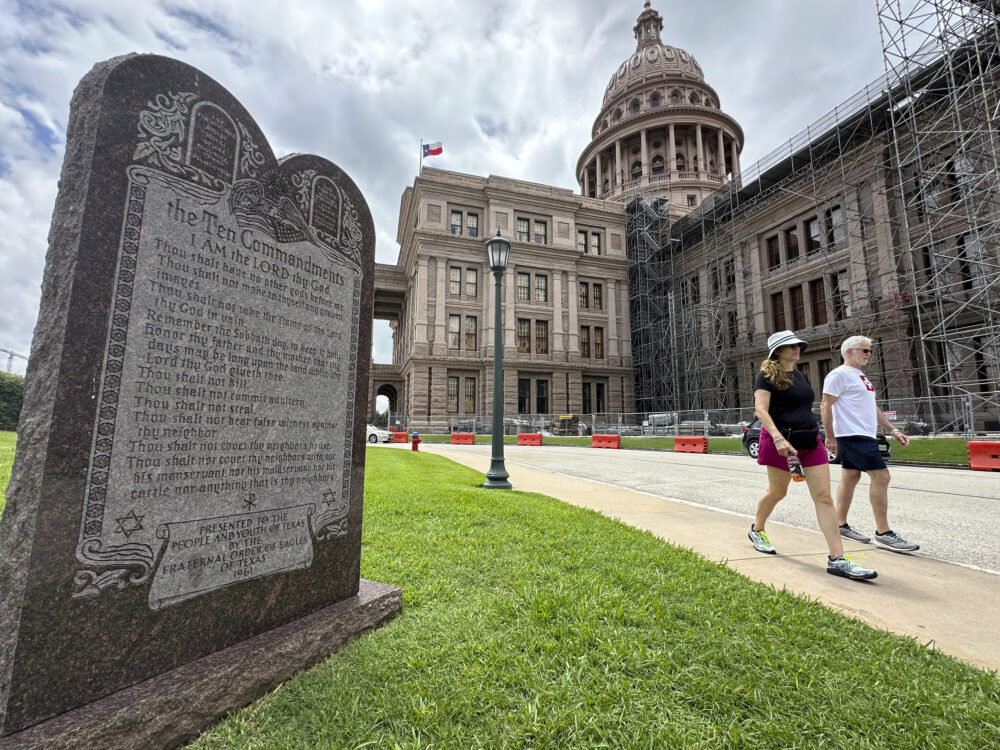In a move that has sparked significant debate across the state and nation, Texas has passed a new law requiring public schools to display the Ten Commandments in every classroom. This legislation, signed into law by Governor Greg Abbott, is part of a broader trend of state lawmakers advocating for greater visibility of religious symbols in public spaces.

New Texas Law Mandates the Ten Commandments in Every Classroom
| Takeaway | Stat or Info |
|---|---|
| Texas students may see the Ten Commandments displayed | 1,000+ classrooms impacted statewide |
| Legal challenges are expected | U.S. Supreme Court has previously ruled on religious displays in public schools |
| Teachers could face pressure to discuss religion | Potential shift in curriculum expectations |
| Public debate over separation of church and state intensifies | 56% of Americans oppose religious displays in public schools |
The Texas law mandating the display of the Ten Commandments in every classroom represents a significant moment in the ongoing discussion about the role of religion in public schools. While supporters argue that it is a return to traditional values, critics view it as a potential violation of constitutional principles. For students and teachers, the law could lead to a new set of challenges and uncertainties. The coming months and years will reveal how this law is implemented and whether it stands up to legal scrutiny. One thing is certain: the conversation about religion in public life will continue to be a contentious issue for the foreseeable future.
The Law in Focus: What Texas Requires
Under this new legislation, all public school classrooms in Texas are now required to display a framed copy of the Ten Commandments. The law mandates that these displays be “clearly visible” in a location where students can see them, such as near the front of the classroom. Governor Abbott signed the bill into law in early June 2025, and school districts across the state are already working on implementing the requirement.
Supporters of the law argue that it promotes moral values and is part of the state’s effort to reintroduce traditional values into public schools. According to Texas lawmakers, the Ten Commandments offer a set of principles that are foundational to the state’s history and the nation’s heritage. “This is a reminder of the moral and ethical foundations that shaped our country,” Abbott stated during the signing ceremony.
The Legal Landscape: Separation of Church and State
Despite the law’s proponents, the mandate is already facing significant legal challenges. Critics argue that the law violates the First Amendment’s Establishment Clause, which prohibits the government from establishing or endorsing a religion. This clause has been the center of numerous Supreme Court rulings regarding religious expression in public schools, including the landmark Engel v. Vitale decision in 1962, which ruled that school-sponsored prayer in public schools was unconstitutional.
Legal experts predict that this law could end up in court, with plaintiffs arguing that it forces public schools to endorse a particular religion, violating the constitutional separation of church and state. The American Civil Liberties Union (ACLU) has already indicated that it will be challenging the law in court, stating that while people are free to practice their religion, the government cannot mandate religious displays in public schools.
“Texas public schools are supposed to be inclusive and non-sectarian,” said ACLU Texas director, Jennifer Rangel. “This law opens the door for religious favoritism, which is not only unconstitutional but can create an uncomfortable and divisive environment for students.”
What This Means for Students and Teachers
For students, the new law could have both direct and indirect impacts. The most immediate change will be the presence of the Ten Commandments in their classrooms. Some students and parents may feel a sense of reassurance, while others may feel uncomfortable or excluded, especially if they follow different religious traditions or none at all.
Teachers, too, face a delicate situation. While the law does not require teachers to discuss or teach the Ten Commandments, there could be unspoken pressures to incorporate religious topics into classroom discussions. For example, students might ask questions about the Commandments, prompting teachers to navigate potentially contentious conversations about religion in a public-school setting.

Reactions from Students, Parents, and Educators
The reaction to the law has been divided, with strong opinions on both sides. On one hand, some parents and religious groups have applauded the law, viewing it as a return to traditional values that should be present in educational settings. “Our children need to see these principles in the classroom,” said one Texas parent, who believes the Ten Commandments provide ethical guidance. “It will help instill moral values and respect.”
On the other hand, critics argue that public schools should remain neutral spaces, where religion is not favored or imposed on students. “As a parent, I don’t want my child to feel pressured to accept one set of religious beliefs,” said another Texas parent, reflecting concerns about the law’s potential to marginalize students of different faiths.
Teachers have also expressed concern, particularly about the potential legal ramifications. Some worry that the law may lead to future lawsuits or conflicts with the curriculum, especially in districts with diverse student populations. Others believe the law could further politicize education, making it harder for educators to focus on teaching core subjects.
The Broader Cultural Debate: Religion in Public Life
The Texas Ten Commandments law is part of a broader cultural debate over the role of religion in public life. Over the past few years, similar laws have been proposed in other states, with some choosing to incorporate religious displays in government buildings or public schools. The rise of these laws, however, has been met with increasing resistance from secular groups and others who see them as a violation of constitutional principles.
The push for more religious displays in public institutions reflects the ongoing culture wars, with one side advocating for a return to traditional religious values and the other side pushing for greater secularism and inclusivity. For many, this law will serve as a litmus test for the state’s commitment to the separation of church and state, as well as its willingness to allow the government to promote religious ideologies in taxpayer-funded institutions.
Looking Ahead: What Happens Next?
As Texas school districts work to implement the new law, the legal and cultural ramifications will likely continue to unfold. If the law survives legal challenges, it may set a precedent for other states to follow suit, prompting more national debate over the boundaries between religion and public institutions.
However, if courts strike down the law, it could reinforce the notion that religious displays in public schools are unconstitutional, preserving the separation of church and state in educational settings. Either way, the debate over the Ten Commandments in classrooms is far from over.
Frequently Asked Questions
Why is the Ten Commandments display required in Texas classrooms?
The law aims to promote moral values and align with what some view as foundational principles of American culture and history. Supporters argue it offers ethical guidance for students, especially those in public schools.
What are the legal challenges to this law?
The law is expected to face challenges in court, with opponents arguing it violates the First Amendment’s Establishment Clause by promoting a particular religion in public schools. The ACLU is already preparing a legal challenge.
How will this law affect students in Texas?
The law could create a more divided environment, with some students feeling supported and others potentially uncomfortable, especially those from different religious backgrounds. Teachers might also face challenges in navigating discussions about religion in the classroom.






